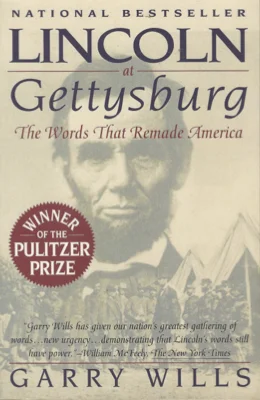by Garry Wills
Why does it take Garry Wills 317 pages to explain Lincoln's 272 words delivered at Gettysburg? Because Lincoln's address was that magisterial and Wills' scholarship that magnificent. Wills, 84 at this writing and Professor Emeritus at Northwestern University, wrote Lincoln At Gettysburg in 1992.
While not dueling for oratory greatness, Lincoln's 272 words eclipse the famed oratory giant Edward Everett, the principal speaker at the dedication whose 13,000 words took two hours to deliver.
Why?
Wills explores the context and the text of Lincoln's famed address, but more than that, the forces that shaped his communication in general and this speech in particular. Readers are treated to the influences of Greek Revival, the "Culture of Death" of that day, the Transcendentalism of Theodore Parker, and the theory and oratory power of Daniel Webster.
The author also demonstrates Lincoln's mastery of thought and style. For Lincoln, the Civil War was about preserving the Union more than freeing slaves. He used the moment to connect people to the Declaration and Constitution -- "a single people dedicated to a proposition" -- and it was unity around that proposition that pushed the issue of slavery in our country toward obsolescence.
As to style, Wills shows us that Lincoln rendered obsolete the communication methods of his day, a mere thirty minutes after Everett spoke. The author's treatment of the power of words, along with the insights from Hugh Blair, Mark Twain, and John Hay is worth the price of the book.
Wills won the Pulitzer Prize for Lincoln At Gettysburg and it is not hard to understand why. This is not light reading, but it is fascinating and so insightful.
Five reasons to read:
1. Scholarship: Put on your deep diving gear; Wills plumbs the depths of this speech, taking us down through cold waters of history to the works of Pericles and Thucydides.
2. Communication: Lincoln At Gettysburg is essential reading for anyone who wants to improve their communication. It is enlightening, educating, and fascinating.
3. Context: Will deftly relays the "need for artful words to sweeten the poisoned air of Gettysburg." Each side claimed fifty thousand dead, wounded, and missing. Residents were forced to plant around bodies in the fields and gardens. Contractors were bidding to bury the bodies of soldiers, a work that intern 100 bodies a day. Will takes the speech out of our classrooms and puts us at Gettysburg.
4. Myth explosion:For years I have believed the myths that Will quickly dispels: (1) The Gettysburg Address was composed "on the fly." (2) That Lincoln was not pleased with the speech, e.g. purportedly saying, "That speech won't scour." Not so.
5. The Tycoon: Wills gives us glimpses of Lincoln through the eyes of his 25-year-old secretary, John Hay (who would later serve as Secretary of State to two Presidents.) Hay referred to Lincoln as "The Tycoon." These interactions are interesting and particularly helpful in examining the power of Lincoln's communication.

